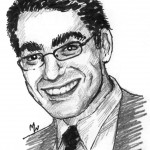Feelings of unity are fleeting. The thrill of school spirit, the brief communal identification that animated campus after Yale’s recent hockey victory lasted mere hours. Students partied for an evening and then went back to their business.
 When limited to apathy about school sporting events, a lack of communal identity isn’t all that concerning. Institutional loyalty to a university is a lovely feeling, but it hardly constitutes a central component of a meaningful life. I wonder, however, whether underlying our collective indifference is some deeper antagonism toward identity.
When limited to apathy about school sporting events, a lack of communal identity isn’t all that concerning. Institutional loyalty to a university is a lovely feeling, but it hardly constitutes a central component of a meaningful life. I wonder, however, whether underlying our collective indifference is some deeper antagonism toward identity.
For years, communal identity has been under a sustained attack. Robust affiliations with religious, national and ethnic groups are viewed as sources of conflict and animosity. Identities, after all, create divisions among people. Divisions lead to defining some people as “others,” and “others” — we are told — are inevitably subjected to dehumanization and violence. Violence, of course, is something we all want to avoid, and so communal identity is tainted with the negative consequences of which it is supposedly the cause.
Now, I don’t mean to imply that we consciously avoid expressions of collective identity. And I certainly don’t imagine that students think to themselves, “I know identity is dangerous. I better get it out of my system quickly by focusing on something relatively inconsequential and doing so only briefly.”
But it seems likely that we have been conditioned to feel discomfort at strong and extended displays of communal and exclusive identity. Too many of us have grown accustomed to rolling our eyes at affirmations of national unity and to viewing expressions of patriotism as quaint and unsophisticated. And as we begin to try to come to grips with recent events in Boston, I think back to last year’s University memorial for the 10th anniversary of 9/11. In this cosmopolitan, global university, the event became a tribute to universalism, with America barely meriting a mention.
As last Sunday showed, we still gravitate naturally toward the occasional expression of collective identity. But in deference to the ethos in which we live, we only embrace those identities that make few demands and that will last only briefly. But if we have let the international intelligentsia curb our passion for meaningful association in their pursuit of a world free of identities, then we have made a costly error.
I hope, of course, that our lack of sustained identification with Yale and its sports teams are a sign of healthy perspective and maturity, rather than an aversion to identity. And if I were not simply looking for a current events lead-in to this column, I would likely praise our brief celebration as proper and proportional. But I worry that our apathy is a symptom of something deeper, a self-defeating fear of the evils that identity might cause.
Last Monday, former Soviet dissident Natan Sharansky visited campus. In a Pierson College Master’s Tea, he spoke about the interconnectedness of freedom and identity — bemoaning an intellectual climate in which the two are increasingly presented as at odds with one another.
Sharansky described how he was raised in an environment of doublethink, where fear kept citizens’ true beliefs and opinions locked beneath an uniform veneer of loyalty to the Soviet state. He discussed the moment when he discovered the courage to simultaneously pursue his Jewish identity and publicly oppose the Soviet’s systematic violation of human rights. And he spoke movingly about how his commitments to both Judaism and freedom strengthened him as he defied the KGB over nine years in the Gulag.
Sharansky insisted that he saw no contradiction in devoting his life both to the particular cause of Jewish nationalism — as a minister in successive Israeli governments and the chairman of the Jewish Agency — as well as advocacy for universal human rights. As Sharansky explained, the meaning provided by his identification with the Jewish past, present and future is precisely what justified and motivated his struggle for freedom.
In Sharansky’s mind, freedom without identity is substanceless and vulnerable. The whole point of promoting freedom is to preserve an individual’s ability to access a communal identity. Similarly, identity is what gives the individual courage and motivation to fight for freedoms. In the increasingly cosmopolitan world in which we live, it is worth taking Sharansky’s words to heart.
So we ought to ask ourselves, with whom do we identify and for what would we give our lives? In other words, for what purpose do we value our freedom? We know should fight for the right to identify as we wish, but what do we do with that freedom the day after we have won it?
Yishai Schwartz is a senior in Branford College. Contact him at yishai.schwartz@yale.edu .







